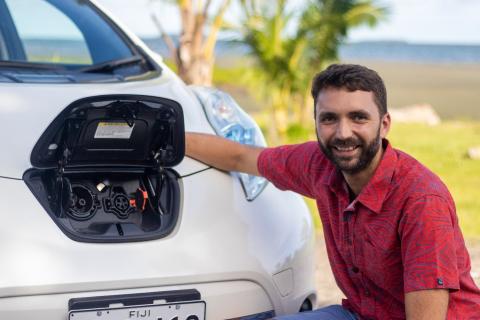LEAF CAPITAL AND PCREEE JOINTLY ADDRESS BARRIERS TO E-MOBILITY IN FIJI AND THE PACIFIC ISLANDS
The Pacific Islands have played a central role in increasing the ambition of the global efforts to reduce greenhouse gas emissions, with Fiji being the first state to sign up to the Paris agreement. However, most carbon mitigation efforts in the Pacific have concentrated on reducing fossil use in electricity generation. The transportation sector, which consumes most of the fossil fuel in the region, is playing a catch-up game.
“The region is currently 100% dependent on fossil fuel for transportation, its renewable energy ambitions are so high, and the average daily driving range is less than 100 km, making it a fertile ground for the electrification of the transportation system (e-mobility),’’ said Solomone Fifita, Manager of the Pacific Centre for Renewable Energy and Energy Efficiency.
In 2021, the PCREEE rolled out its Business Plan 2021- 2030 which includes Sustainable Energy Business Mentoring and Support as well as a Sustainable Mobility readiness programme. The PCREEE believes the private sector is best placed to deploy sustainable transport initiatives in the Pacific Islands, designing approaches that will meet local needs.
E-mobility is new to the Pacific and Fiji: despite official support for the deployment of charging infrastructure in the form of subsidies, the regulatory environment presents several challenges to investing in charging infrastructure. The principal challenge that E-mobility must address is compliance with the legislations and regulations of the power utility, many of which were put in place decades ago, before the advent of distributed renewable electricity generation or electric mobility.
Leaf Capital Pte Ltd was established in Fiji in 2021 with the goal of establishing the Pacific’s first national EV charging network, starting in Fiji’s main island of Viti Levu. At the heart of the company’s vision is the ambition to developing an EV charging ecosystem that is sustainable, generating more renewable power than it uses, while also contributing to the wider goals of emission reduction and energy security by using smart charging technologies.
Photo: Alex Reddaway, owner and Director of Capital Leaf, with an electric Nissan Leaf in Suva.
EV charging can present a number of challenges for utilities, especially in small island grids: at a national level, increases in demand are often met with diesel generators, increasing the share of fossil fuels in the energy mix; at a local level, increased demand outside of the main urban areas can require expensive grid upgrades. Leaf Capital aims to address these issues by developing a model that will deploy EV charging, smart charging technologies and renewable energy generation in tandem, using a leasing model to reduce the capex burden on charger host venues. The company’s DC Fast Chargers will be installed with “load guards” which sense the load being drawn from the grid and adjust the charger’s usage to keep total load under a pre-set maximum. By installing solar arrays on site, the company will increase the amount of electricity that the chargers can draw without reaching this limit, ensuring that customers are able to charge at maximum speed during daylight hours. Leaf Capital will also work with the utility to ensure that specific sections of the grid are not overburdened as demand for charging increases: by using software based Dynamic Load Management the company can create groups of chargers and limit the total electricity that they can draw. The company’s home chargers will also be network connected, ensuring that they can be remotely programmed to charge at times when the grid is best able to provide electricity.
While these technological solutions have been extensively tested, they have not yet been demonstrated in conjunction with renewable energy installations or in a regulatory environment such as Fiji’s, where the legislation predates the advent of electric mobility. A number of significant challenges remain, not least the question of how to monetise charging infrastructure when the utility has the exclusive right to sell electricity.
The PCREEE and Leaf Capital have therefore entered into a partnership to jointly explore ways in which to put in place the company’s vision for a commercially viable, renewable energy based EV charging ecosystem while complying with the relevant legislation and regulations in Fiji. “The main challenge for E-mobility in the Pacific is not technical or financial, it is regulatory. While this uncertainty persists it will be difficult to mobilise the resources required to develop charging networks that will give people to confidence needed to shift to EVs. This partnership in Fiji could help unlock opportunities for e-mobility across the Pacific,” said Alex Reddaway, owner and Director of Capital Leaf. Solar leasing models have been trialled with success in Fiji and the partnership is looking to also assess some of the legal avenues that have worked with pure solar and adapt them to match the requirements of its solar + charging model. The key concern is to structure the lease in accordance with the existing legislations.
Similar issues have been encountered in several jurisdictions and workarounds have been found: the simplest is simply to charge by the minute rather than by the kWh. While these billing systems have been successful elsewhere, it would be invaluable under this partnership to have a well-researched legal opinion that lays out the options available within the existing legal framework. This would allow private sector actors and investors to proceed in the way that is fairest to both suppliers and customers, whilst adhering to all regulatory requirements.
Learn More:
https://pcreee.org/article/tonga-firms-actions-address-sustainable-mobility">Tonga firms up actions to address sustainable mobility | PCREEE
https://pcreee.org/article/pcreee-supports-pacific-islands-leading-cop-2...">PCREEE SUPPORTS PACIFIC ISLANDS LEADING UP TO COP 26 TALK | PCREEE
https://pcreee.org/article/stakeholders-mobilized-promote-low-carbon-lan...">Stakeholders mobilized to promote Low Carbon Land Transport in the Pacific Islands | PCREEE





